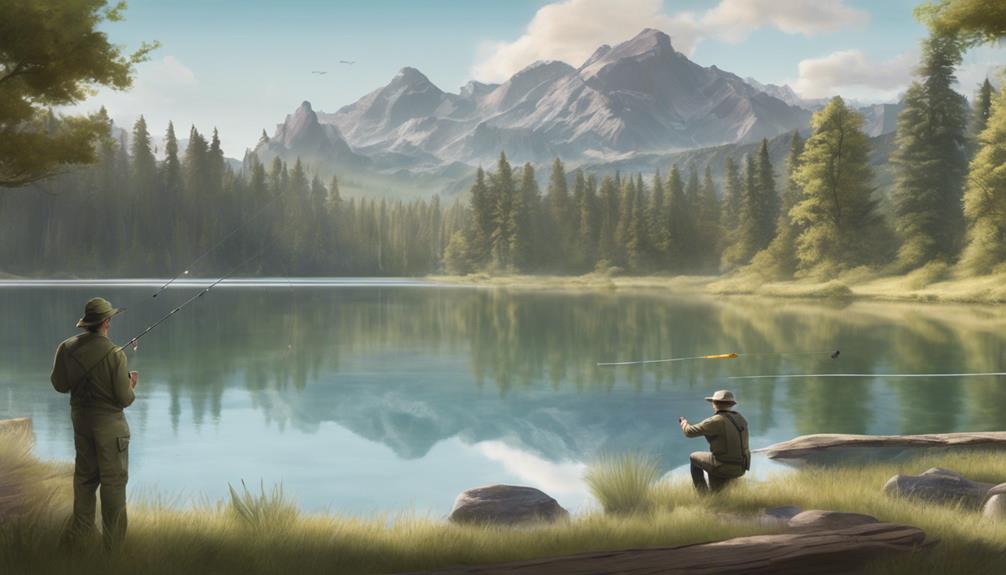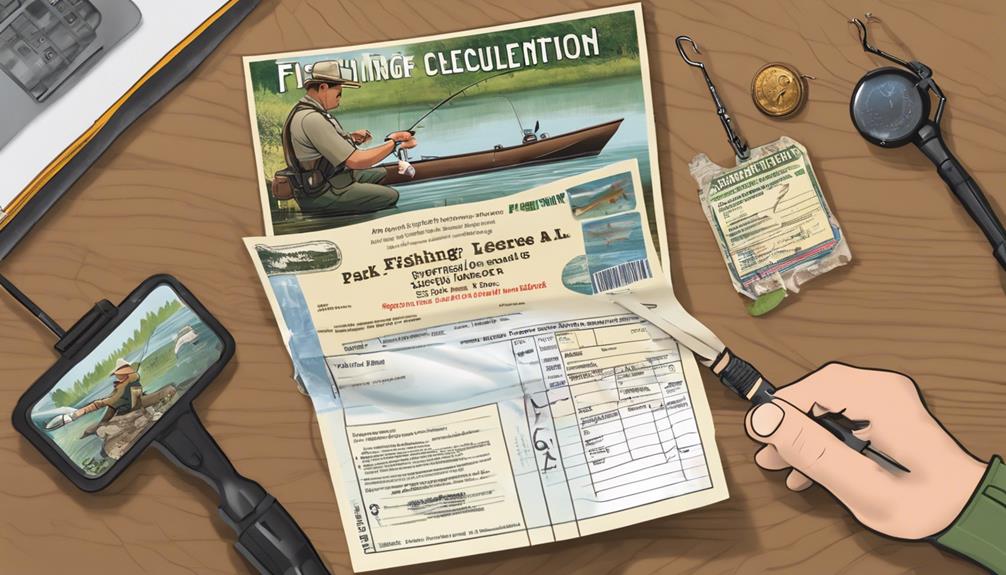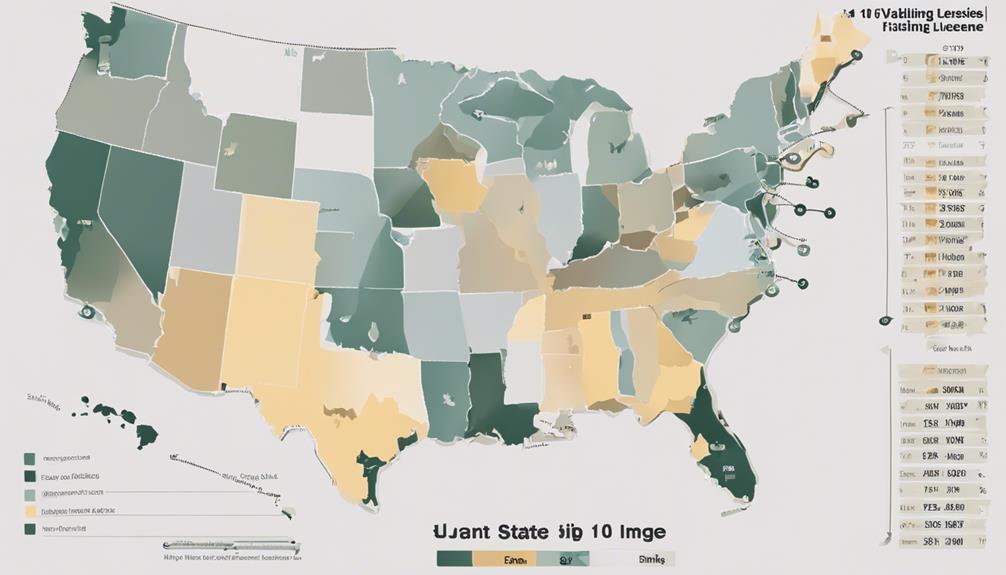Have you ever wondered how you can steer clear of fishing license violation penalties? Understanding the regulations is just the beginning. By knowing when your license expires and abiding by catch limits, you can avoid unnecessary fines.
But there's more to it than that. Stay tuned to discover crucial tips that will help you enjoy your fishing excursions legally and penalty-free.
Understanding Fishing License Requirements
To fish legally in most places, you must have a valid fishing license. Understanding regulations is crucial to ensure you comply with the specific rules governing fishing activities in your area. Regulations can vary significantly from one location to another, so it's essential to familiarize yourself with the laws and guidelines that apply to the waters where you plan to fish. License enforcement is taken seriously to protect fish populations and ensure sustainable fishing practices. Ignoring these regulations can result in penalties and fines, which can be easily avoided by obtaining the necessary permits and following the rules.
License enforcement is typically managed by local authorities, such as fish and wildlife agencies or conservation departments. These agencies are responsible for monitoring compliance with fishing regulations, conducting inspections, and issuing citations to individuals found fishing without a valid license. Penalties for fishing without a license can range from fines to court appearances, and in some cases, may even lead to confiscation of fishing equipment. By understanding the importance of fishing regulations and license enforcement, you can help protect the environment and preserve fishing opportunities for future generations.
Checking License Expiration Dates
Check the expiration dates on your fishing license regularly to ensure you remain compliant with regulations. Understanding regulations is crucial to avoid fines and penalties associated with expired licenses.
Here are five tips to help you stay on top of your fishing license expiration dates:
- Set Reminders: Use your phone or calendar to set reminders a month before your license expires.
- Keep a Digital Copy: Take a picture or scan your fishing license, including the expiration date, and store it on your phone or a cloud service for easy access.
- Mark it on Your Calendar: When you receive your fishing license, immediately mark the expiration date on your calendar to track it visually.
- Renew Early: Don't wait until the last minute to renew your license. Renew it early to avoid any lapse in validity.
- Check Online: Some states provide online portals where you can enter your license information and receive expiration date reminders.
Following Catch Limits and Regulations
Make sure you adhere to catch limits and regulations while fishing to avoid penalties and stay in compliance with the law. It's crucial to verify the catch limits for the specific area where you're fishing to ensure you aren't exceeding the allowed amount. Conservation efforts rely on these catch limits to protect fish populations and ensure sustainable fishing practices. By following these regulations, you contribute to the preservation of aquatic ecosystems and help maintain a healthy balance in the environment.
When out fishing, always be mindful of the catch verification process. Some areas require you to keep the catch intact until you reach your final destination or until a conservation officer can verify the species and quantity caught. Failure to comply with catch verification procedures can result in penalties and fines, so it's essential to familiarize yourself with the specific requirements of the region you're fishing in.
Remember that catch limits and regulations are put in place for a reason. They're designed to prevent overfishing, protect vulnerable species, and support the overall health of the aquatic environment. By respecting these guidelines, you play a vital role in supporting conservation efforts and ensuring that future generations can continue to enjoy fishing as a recreational activity.
Keeping License on Hand When Fishing
Always ensure you have your fishing license readily accessible while you're out fishing. Keeping your license on hand not only ensures you're abiding by the law but also makes it easier for officials to verify your compliance quickly. Here are some tips to help you keep your license safe and visible:
- License storage: Invest in a waterproof license holder that you can wear around your neck or attach to your fishing gear. This will keep your license secure and prevent it from getting lost or damaged.
- License visibility: Make sure your license is prominently displayed and easily visible. Consider placing it in a clear plastic sleeve on your fishing vest or tackle box for easy access.
- Check before you leave: Always double-check that you have your fishing license with you before heading out. It's better to be safe than sorry.
- Regularly inspect your license: Periodically check your license for wear and tear. If it becomes faded or damaged, consider getting a new one to avoid any issues.
- Inform fishing buddies: Remind your fishing companions to also keep their licenses on hand. This way, everyone in your party is prepared in case of a license check.
Renewing Licenses Before Expiry
Consider renewing your fishing license before it expires to avoid any potential violations. Renewal reminders are often sent out by the issuing authority, but it's also a good idea to keep track of your license's expiration date. By renewing early, you can ensure that you have a valid license at all times, eliminating the risk of fishing without one.
Early renewals can help you avoid any lapses in your fishing privileges. It's easy to forget about renewing your license, so taking care of it ahead of time can save you from facing penalties for fishing with an expired license. Many states offer the option to renew your license online, making it a quick and convenient process.
Reporting Lost or Stolen Licenses Promptly
To ensure compliance with fishing regulations and avoid potential penalties, promptly report any lost or stolen fishing licenses to the issuing authority. Failing to report a lost or stolen license can lead to legal consequences and may result in fines or other penalties.
Here are some essential points to consider when dealing with lost or stolen fishing licenses:
- License Replacement Process: Contact the issuing authority immediately to inquire about the steps required to replace your lost or stolen fishing license. They'll provide you with guidance on how to obtain a new license promptly.
- Legal Implications: Understand that using a lost or stolen fishing license knowingly can have severe legal repercussions. It's essential to adhere to the regulations and report any issues promptly to avoid facing legal consequences.
- Documentation: Keep any documentation or proof of reporting the lost or stolen license. This can serve as evidence that you took the necessary steps to rectify the situation.
- Temporary Permits: In some cases, the issuing authority may provide you with a temporary permit while you wait for your replacement license. Make sure to inquire about this option.
- Compliance: Ensure that you comply with any additional requirements or instructions provided by the issuing authority during the replacement process. It's crucial to follow their guidance to avoid any further violations.
Complying With Special Fishing Zone Rules

Ensure compliance with special fishing zone rules by familiarizing yourself with the specific regulations in place for the designated areas. Zoning restrictions are put in place to protect certain species, habitats, or for safety reasons. To avoid penalties, it's crucial to understand and follow these rules diligently.
When it comes to complying with special fishing zone rules, there are some key compliance tips to keep in mind. Firstly, always check the zoning restrictions for the area you plan to fish in. Different zones may have different rules regarding the type of fish you can catch, the equipment you can use, or even the time of day you can fish. Ignoring these regulations can result in fines or other penalties.
Secondly, make sure to stay informed about any updates or changes to the zoning restrictions. Regulations can evolve based on environmental factors or conservation efforts, so what was allowed last season may not be permissible this time around. Staying up to date can help you avoid unintentional violations.
Lastly, respect the special fishing zones and the reasons behind the regulations. These rules are in place to preserve the ecosystem and ensure sustainable fishing practices. By following the guidelines set for each area, you contribute to the conservation of marine life and habitats, making it a better experience for everyone.
Seeking Clarification From Authorities
If you have any uncertainties about the fishing regulations in a specific area, reach out to the relevant authorities for clarification. Asking questions and seeking guidance from the appropriate agencies can help you avoid unintentional violations and hefty penalties.
Here are some tips to consider when seeking clarification from authorities:
- Identify the Correct Agency: Determine which agency or department is responsible for regulating fishing in the area where you plan to fish. This could be the state's Department of Fish and Wildlife, the National Park Service, or a local conservation authority.
- Review Official Guidelines: Check the official fishing guidelines provided by the relevant authorities. These documents often contain detailed information about fishing regulations, permitted areas, catch limits, and any special restrictions.
- Contact Information: Look for contact information for the relevant authorities, such as phone numbers, email addresses, or office locations. Reach out to them with specific questions or concerns you may have regarding fishing regulations.
- Ask Clear and Specific Questions: When contacting the authorities, make sure to ask clear and specific questions about the regulations you're unsure about. Provide details about the location, type of fishing, and any other relevant factors.
- Follow Up if Needed: If you receive information that's unclear or incomplete, don't hesitate to follow up with the authorities for further clarification. It's essential to have a clear understanding of the rules to avoid any violations.
Frequently Asked Questions
Can Fishing Licenses Be Transferred Between Individuals?
Yes, fishing licenses can't be transferred between individuals. They aren't like gifts that can be given or shared. Each angler must obtain their own license to fish legally.
Are There Any Exceptions for Certain Age Groups When It Comes to Needing a Fishing License?
If you're wondering about age exemptions for fishing licenses, some states may have exceptions for certain age groups. These exemptions could vary based on state regulations, so it's important to check the specific rules in your area.
When it comes to license transferability, not all states allow licenses to be transferred between individuals.
Always renew your license on time to avoid violation consequences and ensure you're fishing legally.
Is There a Difference in Penalties for Violating Fishing License Regulations in Different States?
Penalty severity for violating fishing license regulations can vary between states. State variations determine the fines or consequences you might face if caught fishing without a license.
It's essential to understand the specific rules of the state you're fishing in to avoid any legal issues. Make sure to research and comply with the regulations to prevent any penalties.
What Should Be Done if a Fishing License Is Damaged Beyond Recognition?
If your fishing license is damaged beyond recognition, you need to get it replaced.
The license replacement process usually involves contacting the relevant authorities and providing necessary information to prove your identity.
Once you have completed the required steps, you should receive a new license to continue fishing legally.
Remember to keep your replacement license in a safe place to avoid any future issues.
Are There Any Discounts or Exemptions Available for Certain Groups of People When Obtaining a Fishing License?
When it comes to getting a fishing license, you might wonder about discount eligibility or exemption criteria for specific groups. Some states offer discounts for seniors, veterans, or residents.
Exemptions can apply to children under a certain age or individuals with disabilities. It's always good to check with your local wildlife agency to see if you qualify for any special rates or exceptions when obtaining your fishing license.
Conclusion
So remember, follow these six tips to avoid fishing license violation penalties.
Always make sure you understand the fishing license requirements.
Check expiration dates, follow catch limits and regulations, and keep your license on hand when fishing.
Renew before expiry, report lost or stolen licenses promptly, and comply with special fishing zone rules.
If you're ever unsure, don't hesitate to seek clarification from authorities.
Stay informed and enjoy fishing responsibly!



